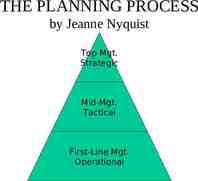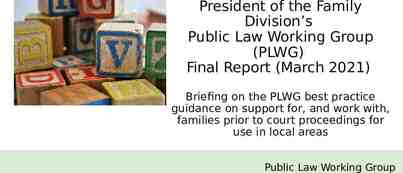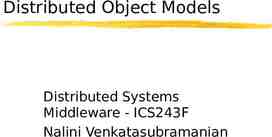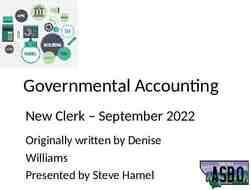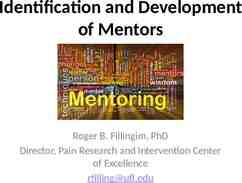Course Syllabus
35 Slides4.82 MB

Course Syllabus

Self-Introduction Wichai Taechawattananan B.Sc. & M.Sc. (Agricultural Economics), FOEBA, KU, & Ph.D. (Economics), FOE, UUM 36-year experience in international business 2 experiences in company set-up Wichai Taechawattananan, Ph.D. 2

Course Name Entrepreneurial Business Management Wichai Taechawattananan, Ph.D. 3

Course Range August to December, 2019 Wichai Taechawattananan, Ph.D. 4

Course Description Participation oriented Concepts, tools, & step-by-step guidelines for management in business Examples of academic & business situations 8 topics: Basic Entrepreneurial Management, Budgeting, Customer Focus, Finance Essentials, Innovation and Creativity, Marketing Essentials, Performance Measurement, & Strategic Thinking Wichai Taechawattananan, Ph.D. 5

Other Topics of Business Management Business Case Development, Business Plan Development, Crisis Management, Decision Making, Diversity, Ethics at Work, Negotiating, Process Improvement, Project Management, & Strategy Execution Wichai Taechawattananan, Ph.D. 6

Course Objectives To deal with situations sensibly and realistically in a way that is based on practical considerations To develop and build on the skills you need to do effectively To understand and familiarize with entrepreneurial skills To train you become entrepreneur with ground knowledge of economics Wichai Taechawattananan, Ph.D. 7

Teaching Methods and Course Structure Wichai Taechawattananan, Ph.D. 8

Teaching Methods and Course Structure (Cont’d) Each Topic Class One Class Two Part one Get started Practice Part two Learn Assess Remark: Basic Entrepreneurial Management topic will have only Learning and Assessment parts. Wichai Taechawattananan, Ph.D. 9

Teaching Methods and Course Structure (Cont’d) Each Topic Class One Part One Get started: Part Two Learn: Students will see the short Students will learn the key scenarios. ideas & examples of real situations. After understanding the After learning, a paer of short scenario, a paper of practice question as the assessment question in first homework will be forms of multiple choice given to students. questions as the second homework will be given to students. Wichai Taechawattananan, Ph.D. 10

Teaching Methods and Course Structure (Cont’d) Each Topic Class One Part One Part Two Get started: Learn: Individual student will present your ideas or suggestions on short scenarios in practice part of next class. Individual student will present your selected choices with explanations in assessment part of next class. Wichai Taechawattananan, Ph.D. 11

Teaching Methods and Course Structure (Cont’d) Each Topic Class Two or Participation Class or Café’ Class Part One Part Two Practice: Assess: From short scenario, students will individually present ideas or suggestions about what to do / what are somethings you could do to help? From multiple choice questions, students will individually present selected choices with explanations. Wichai Taechawattananan, Ph.D. 12

Teaching Methods and Course Structure (Cont’d) Each Topic Class Two or Participation Class or Café’ Class Part One Part Two Practice (Cont’d): Assess (Cont’d): Students’ ideas or suggestions could be from my teaching documents or other academic documents. Students’ selected choices with explanations in writing will be also required. Students’ ideas or suggestions in writing will be also required. Wichai Taechawattananan, Ph.D. 13

Teaching Methods and Course Structure (Cont’d) Purposes of the course structure represent the core elements of learning, provide an opportunity to exchange ideas and questions with student fellows, discuss how to apply concepts and skills Wichai Taechawattananan, Ph.D. 14

Class Time and Course Schedule Class time Course schedule Date 14th August, 2019 21st August, 2019 Wednesdays 9am – 12am, 16 classes 28th August & 4Th September, 2019 total 18Th & 25th September, 2019 2nd & 9th October, 2019 16Th & 23rd October, 2019 30Th October & 6Th November, 2019 13th & 20th November, 2019 27Th November & 4Th December, 2019 Wichai Taechawattananan, Ph.D. Topic Introduction to Course & Basic Entrepreneurial Management Basic Entrepreneurial Management (Cont’d) Budgeting Customer Focus Finance Essentials Innovation and Creativity Marketing Essentials Performance Measurement Strategic Thinking 15

Grade Criteria Wichai Taechawattananan, Ph.D. 16

Grade Criteria (Cont’d) The absence of class is not considerably accepted, unless otherwise, student has a substantial evidence i.e. medical certificate. ABSENCE OF CLASS WILL AFFECT GRADE DIRECTLY. Wichai Taechawattananan, Ph.D. 17

Example of Teaching Document

Ethics at Work Wichai Taechawattananan, Ph.D.

Class Request Limit electronic interruptions. Take part in the discussion. Listen carefully to what is being said. The CHAT PANEL is enabled for the session. Use the RAISE HAND feature to volunteer to speak. Put your phone on mute when not speaking. Wichai Taechawattananan, Ph.D. 20

Outline Topic objectives Get started Learn , Ph.D. 21

Topic Objectives To understand the importance of conducting business ethically To apply a structured framework to resolve "right-versus-right" ethical dilemmas To build a culture of integrity among employees, customers, and other stakeholders To recognize the complexity of making ethical decisions across borders Wichai Taechawattananan, Ph.D. 22

Get Started Viktor, an operations manager at Principle Tools, sits brooding at his desk. He has learned over the weekend that Barbara, one of his most talented recent hires, lied about her education credentials when applying for the job in his department six months ago. Wichai Taechawattananan, Ph.D. 23

Get Started (Cont’d) At a professional event on Saturday, Viktor had met Mike, a manager at Principle Tools' biggest competitor, A1Corp. When Viktor learned that Mike had worked with Barbara at A1Corp, he commented on her strong skills, adding, "I'm so impressed she earned an advanced business degree at City University while working full time." Startled, Mike replied, "That's strange. I remember when Barbara enrolled in her first MBA class two years ago. She loved the class, but couldn't complete it because it was too much work for her. She couldn't possibly have finished the degree already." Wichai Taechawattananan, Ph.D. 24

Get Started (Cont’d) Back at his desk, Viktor wonders what to do. He's called City University, and verified that Barbara only completed three classes toward her MBA. Should he fire Barbara for misrepresenting her qualifications? This would send a message that Principle Tools values education and honesty. But Principle Tools would lose Barbara's talents at a time when it desperately needs them. Should he do nothing so Principle Tools can continue benefiting from Barbara's skills? If other employees discover that Barbara has kept her job despite lying, they might conclude that Principle Tools doesn't live its stated values. Cynicism and resentment could erode team productivity and morale. He checks Principle Tools' code of conduct, but it doesn't address this situation. What would you do? Wichai Taechawattananan, Ph.D. 25

Answer Guideline Use a disciplined framework and a structured three-phase approach to resolve such dilemma Wichai Taechawattananan, Ph.D. 26

Example of Practice Paper After getting start. I will give you a paper of practice question. Here is an example. Wichai Taechawattananan, Ph.D. 27
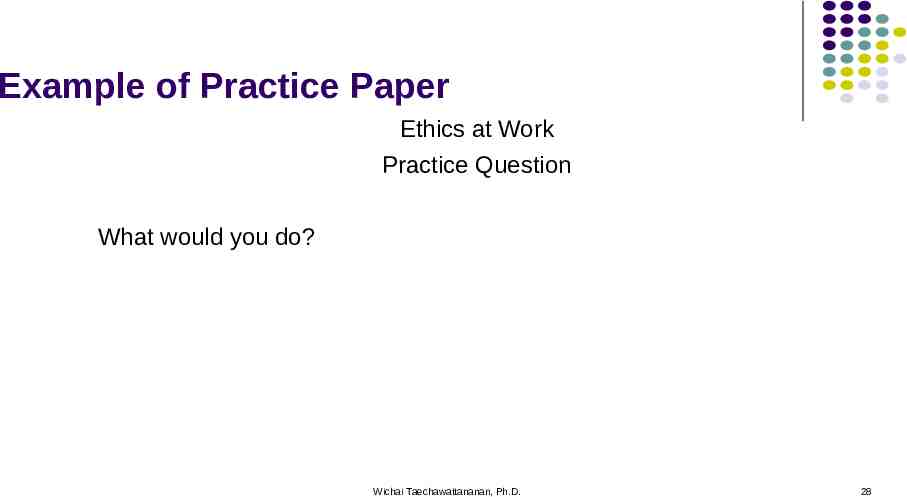
Example of Practice Paper Ethics at Work Practice Question What would you do? Wichai Taechawattananan, Ph.D. 28

Learn

Reviewing Ethical Decision-Making Frameworks There are numerous decision-making frameworks available for resolving ethical dilemmas. But many have limitations. Here’s a quick review of several and an analysis of their limitations: Wichai Taechawattananan, Ph.D. 30
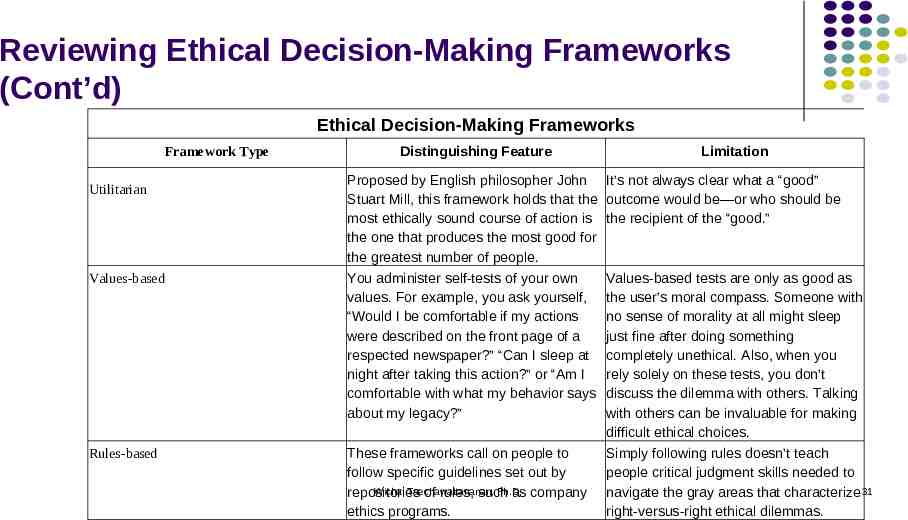
Reviewing Ethical Decision-Making Frameworks (Cont’d) Ethical Decision-Making Frameworks Framework Type Utilitarian Distinguishing Feature Limitation Proposed by English philosopher John It’s not always clear what a “good” Stuart Mill, this framework holds that the outcome would be—or who should be most ethically sound course of action is the recipient of the “good.” the one that produces the most good for the greatest number of people. Values-based You administer self-tests of your own values. For example, you ask yourself, “Would I be comfortable if my actions were described on the front page of a respected newspaper?” “Can I sleep at night after taking this action?” or “Am I comfortable with what my behavior says about my legacy?” Values-based tests are only as good as the user’s moral compass. Someone with no sense of morality at all might sleep just fine after doing something completely unethical. Also, when you rely solely on these tests, you don’t discuss the dilemma with others. Talking with others can be invaluable for making difficult ethical choices. Rules-based These frameworks call on people to follow specific guidelines set out by Wichai Taechawattananan, Ph.D. repositories of rules, such as company ethics programs. Simply following rules doesn’t teach people critical judgment skills needed to navigate the gray areas that characterize 31 right-versus-right ethical dilemmas.
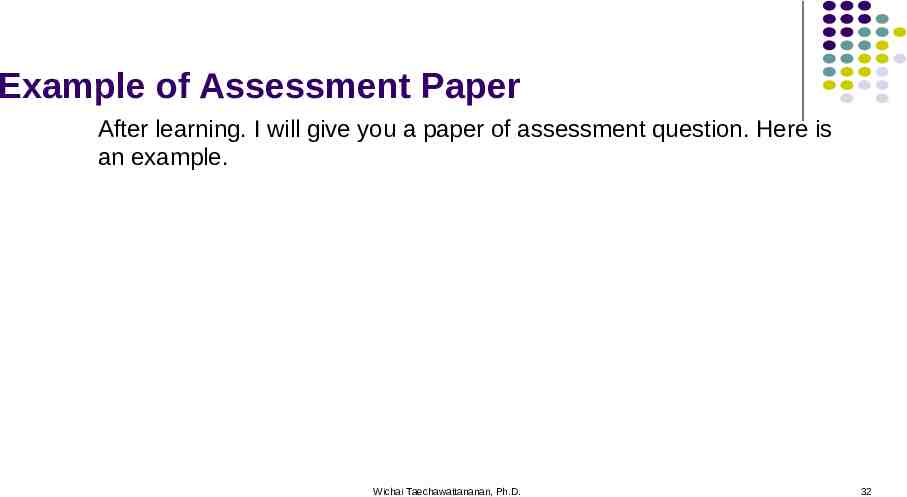
Example of Assessment Paper After learning. I will give you a paper of assessment question. Here is an example. Wichai Taechawattananan, Ph.D. 32
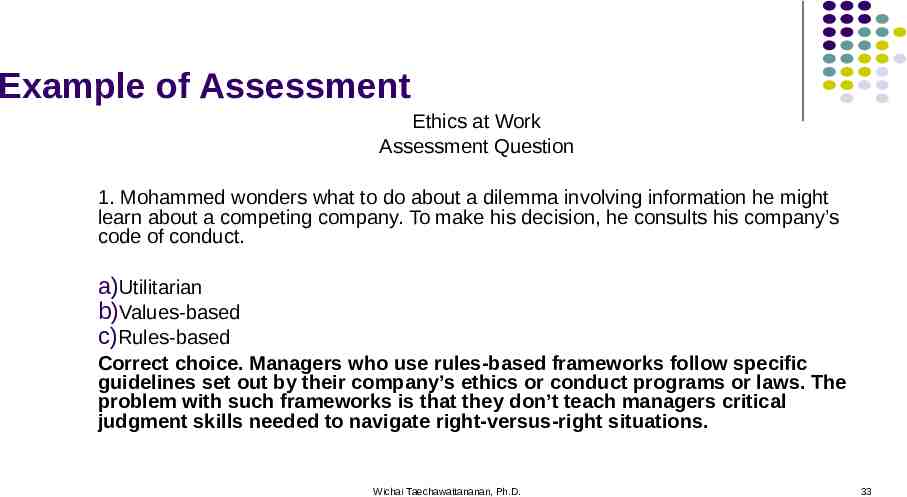
Example of Assessment Ethics at Work Assessment Question 1. Mohammed wonders what to do about a dilemma involving information he might learn about a competing company. To make his decision, he consults his company’s code of conduct. a)Utilitarian b)Values-based c)Rules-based Correct choice. Managers who use rules-based frameworks follow specific guidelines set out by their company’s ethics or conduct programs or laws. The problem with such frameworks is that they don’t teach managers critical judgment skills needed to navigate right-versus-right situations. Wichai Taechawattananan, Ph.D. 33
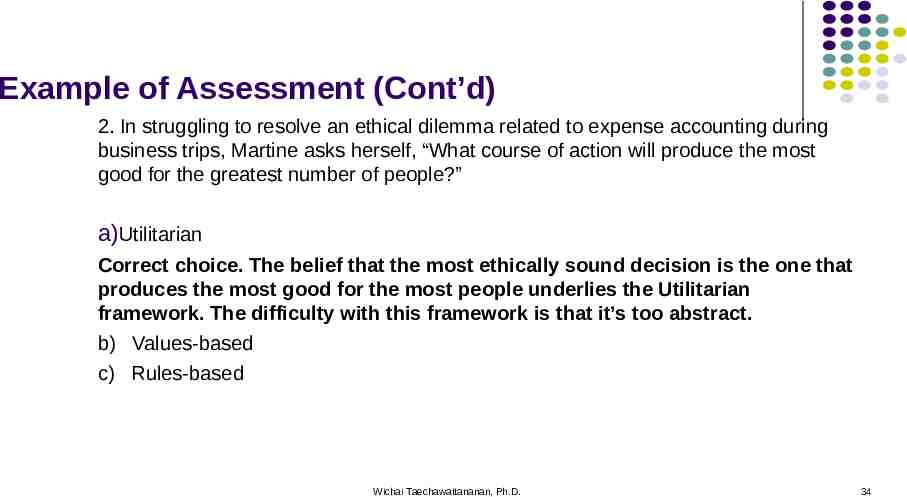
Example of Assessment (Cont’d) 2. In struggling to resolve an ethical dilemma related to expense accounting during business trips, Martine asks herself, “What course of action will produce the most good for the greatest number of people?” a)Utilitarian Correct choice. The belief that the most ethically sound decision is the one that produces the most good for the most people underlies the Utilitarian framework. The difficulty with this framework is that it’s too abstract. b) Values-based c) Rules-based Wichai Taechawattananan, Ph.D. 34

Wichai Taechawattananan, Ph.D. 35


